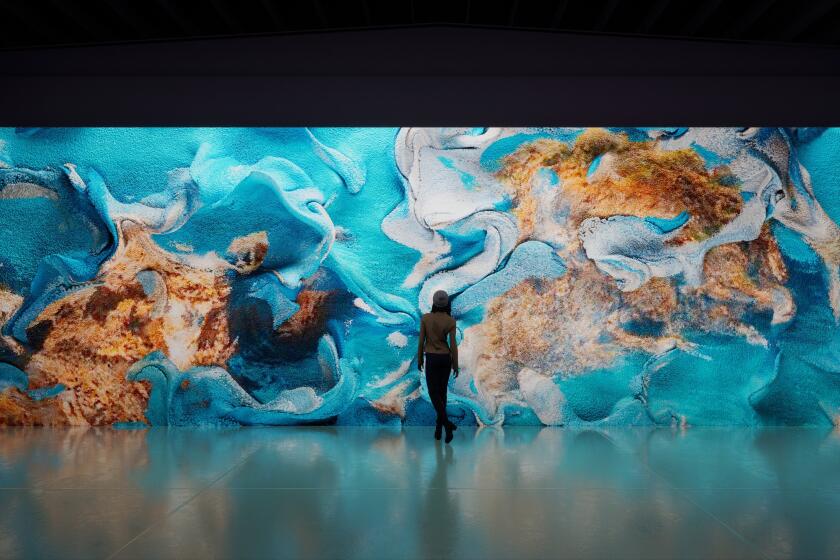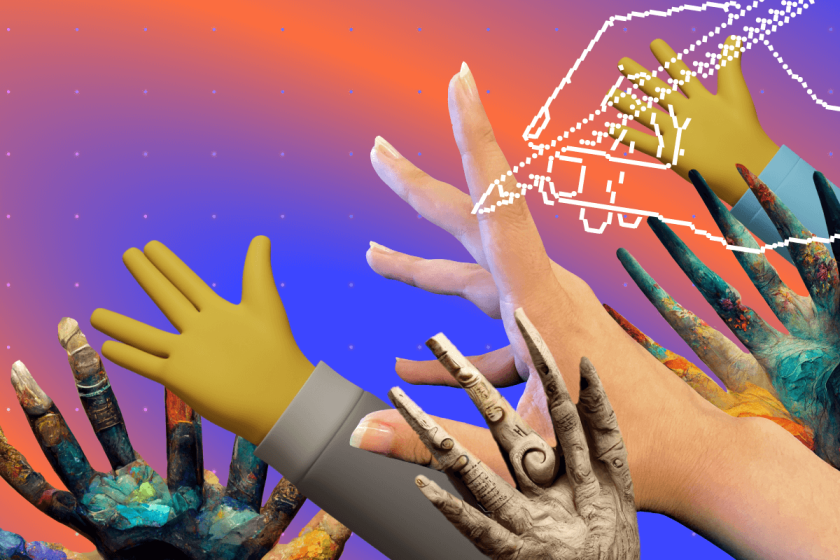The latest canvas for Refik Anadol’s AI-generated art? The new Sphere in Las Vegas
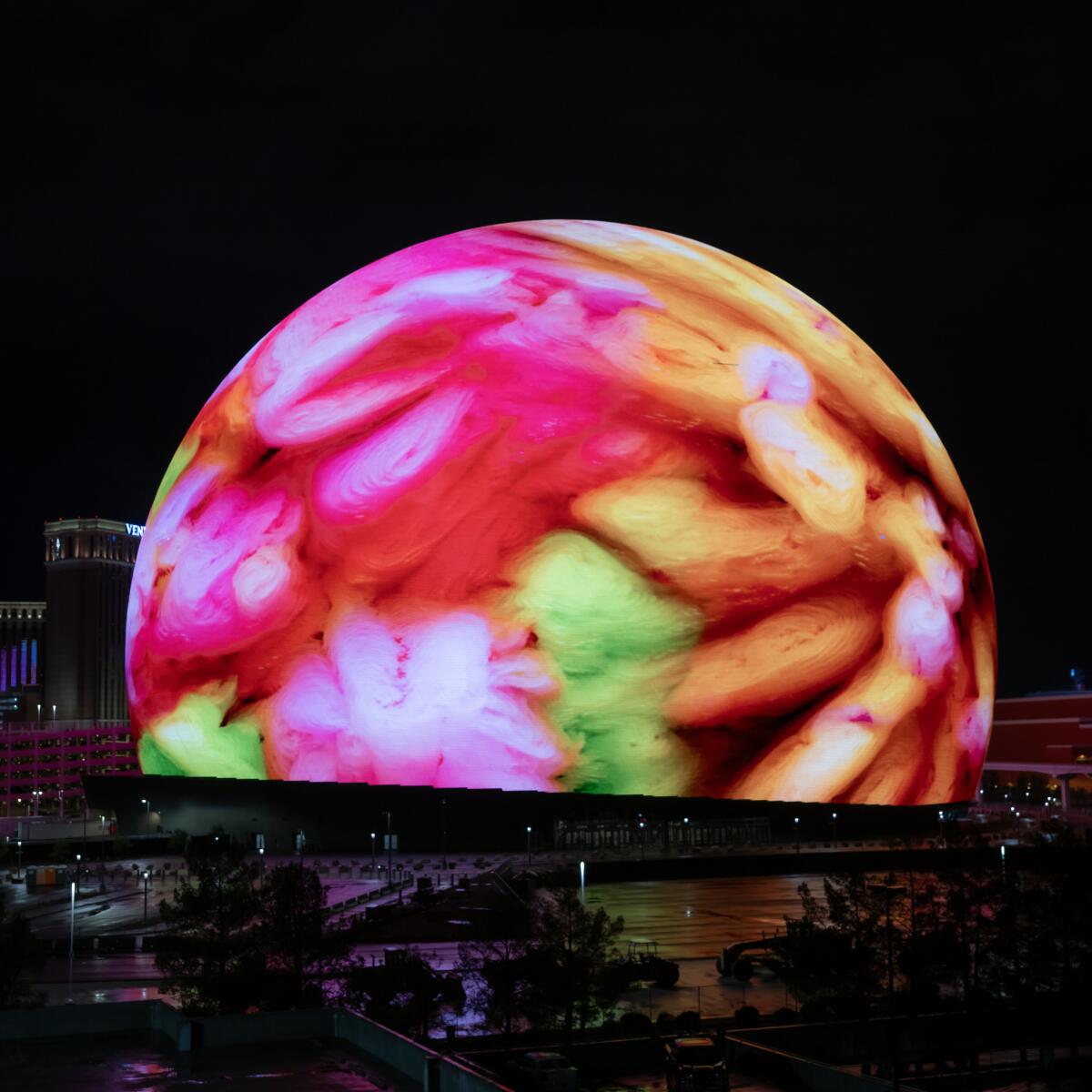
Digital artist Refik Anadol’s next canvas? The world’s largest LED screen.
Anadol will take over the exterior of the soon-to-debut Sphere in Las Vegas, a glowing, 366-foot-tall, globe-shaped events venue that will open Sept. 29 with a series of U2 concerts. The exterior of the futuristic-looking building, or the “Exosphere,” as it’s being referred to, is a 580,000-square-foot programmable LED screen that will be used as a 360-degree canvas by rotating artists.
Anadol’s piece, an artificial intelligence data sculpture called “Machine Hallucinations: Sphere,” will inaugurate the Exosphere art program. It goes live on Sept. 1 and will run for four months.
Refik Anadol’s AI-generated art show opened this week at Jeffrey Deitch during Frieze. It’s the artist’s first major solo gallery exhibition in L.A.
The piece, like other works by Anadol, uses publicly available data and machine learning algorithms to create large-scale animated abstractions that, in this case, draw on outer space, nature and urban environments.
Anadol and his team created “two chapters,” or two versions of the work, that run one after the other, repeatedly, using dynamic programming. “Meaning they play at different speeds, with different forms, colors and shapes each time. It’s generative art,” Anadol says.
The first “chapter” uses about 1.1 million publicly available images taken by satellites and spacecraft, including from the International Space Station and NASA’s Hubble telescope
The second chapter uses about 300 million publicly sourced images of flora and fauna from national parks worldwide as well as data sets on wind, gust speeds, precipitation and air pressure gathered from wind sensors in Las Vegas.
“Machine Hallucinations: Sphere” is not unlike Anadol’s previous work, but its unusual canvas required “a whole new thinking and new algorithms,” the artist says.
“We used similar AI research, but it required a very unique approach because every visual is matching the complex surface and engineering requirements of the Exosphere. It’s so cutting edge, the canvas is extraordinary. It was a really beautiful challenge.”
The overall work, Anadol says, is meant to be a multi-sensory experience leading viewers to “alternative realities.”
“To me, it’s questioning reality,” he says. “[It’s] this incredible architectural form in public urban space and this incredible art form. We’re used to canvas and sculpture and paintings and video, but this time, the whole building is a canvas — and not one with corners. It’s challenging our perceptions. It’s a really powerful statement and experiment reinterpreting the limits of our understanding of what is a canvas.”
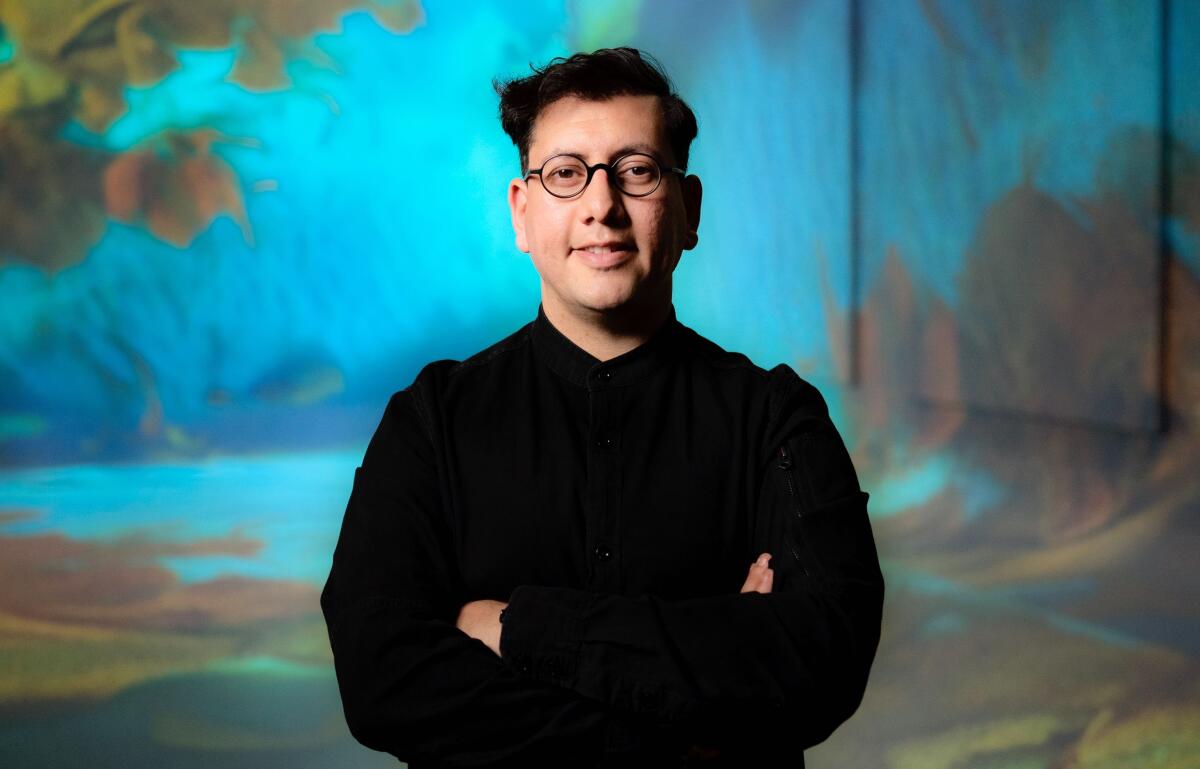
The Sphere, which cost more than $2 billion to build, has been about seven years in the making. It broke ground directly behind the Venetian Resort, just off the Strip, in September 2018 and was designed by the global architectural studio Populous.
Sphere Entertainment describes the venue as “a next-generation entertainment medium powered by cutting-edge technologies to redefine the future of entertainment.”
That means taking immersive entertainment to the next level. The interior space, which will be used for films, concerts, sporting events and video game competitions, among other things, features the highest-resolution LED screen in the world that‘s also meant to completely envelopthe audience.
Laser beam-like audio will direct sound to individual areas so that, say, one group might hear a film or live show in one language while another section hears it in another — without any audio overlapping. Audiences may experience environmental conditions such as wind, heat, humidity or scents. The space also uses advanced haptics, so viewers feel physical sensations occurring on-screen, such as driving over a bumpy pothole.
Filmmaker Darren Aronofsky created an immersive movie, “Postcard From Earth,” for the Sphere. The narrative-documentary hybrid premieres Oct. 6 and features scenes from every continent. As Aronofsky describes it, the film is “a sci-fi journey deep into our future as our descendants reflect on our shared home.”
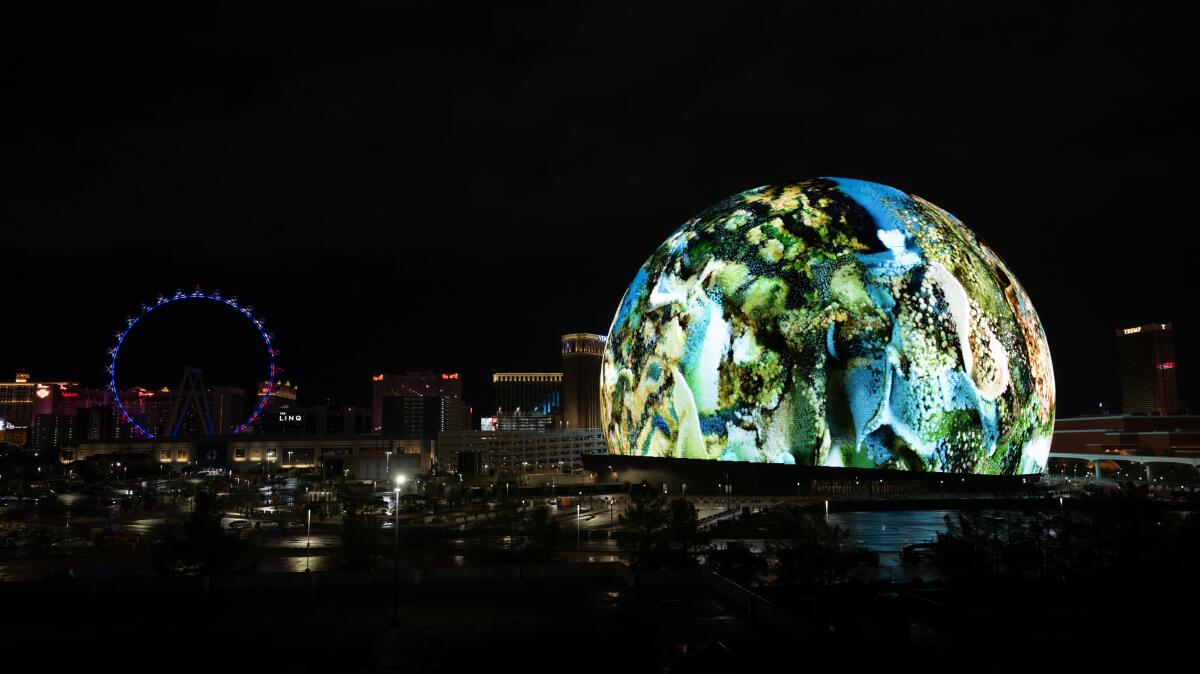
Sphere Entertainment’s Guy Barnett, senior vice president of brand strategy and creative development, says Anadol was “the perfect choice for the first artist” for the Sphere art program.
“He works with a combination of scientific and technology driven art,” Barnett says. “And he’s had an abiding interest in architecture since he started his career. So [it’s] that combination of all the things we’re interested in.”
It’s too soon to name other upcoming artists that will use the Exosphere, Barnett says. But the in-progress lineup is international, he says, and represents a range of artists, both emerging and established.
“What we’re always trying to do is to surprise and delight people,” Barnett says. “The artists will be extremely diverse, representing all sorts of tastes in art, and we’ll be as playful as possible.”
The Istanbul-born Anadol, who is also a computer programmer, has lived in L.A. since 2012. His 16-person team is based in the Frogtown neighborhood of the city.
Anadol created the backdrop for this year’s Grammys stage, and earlier this year had his first first major solo gallery exhibition in L.A. at Jeffrey Deitch. The exhibition featured his AI-generated “living paintings,” as he calls them.
He also projected his work, “WDCH Dreams,” onto the exterior of the Walt Disney Concert Hall in fall 2018 for a weeklong public art installation marking the Los Angeles Philharmonic’s 2018-19 centennial season.
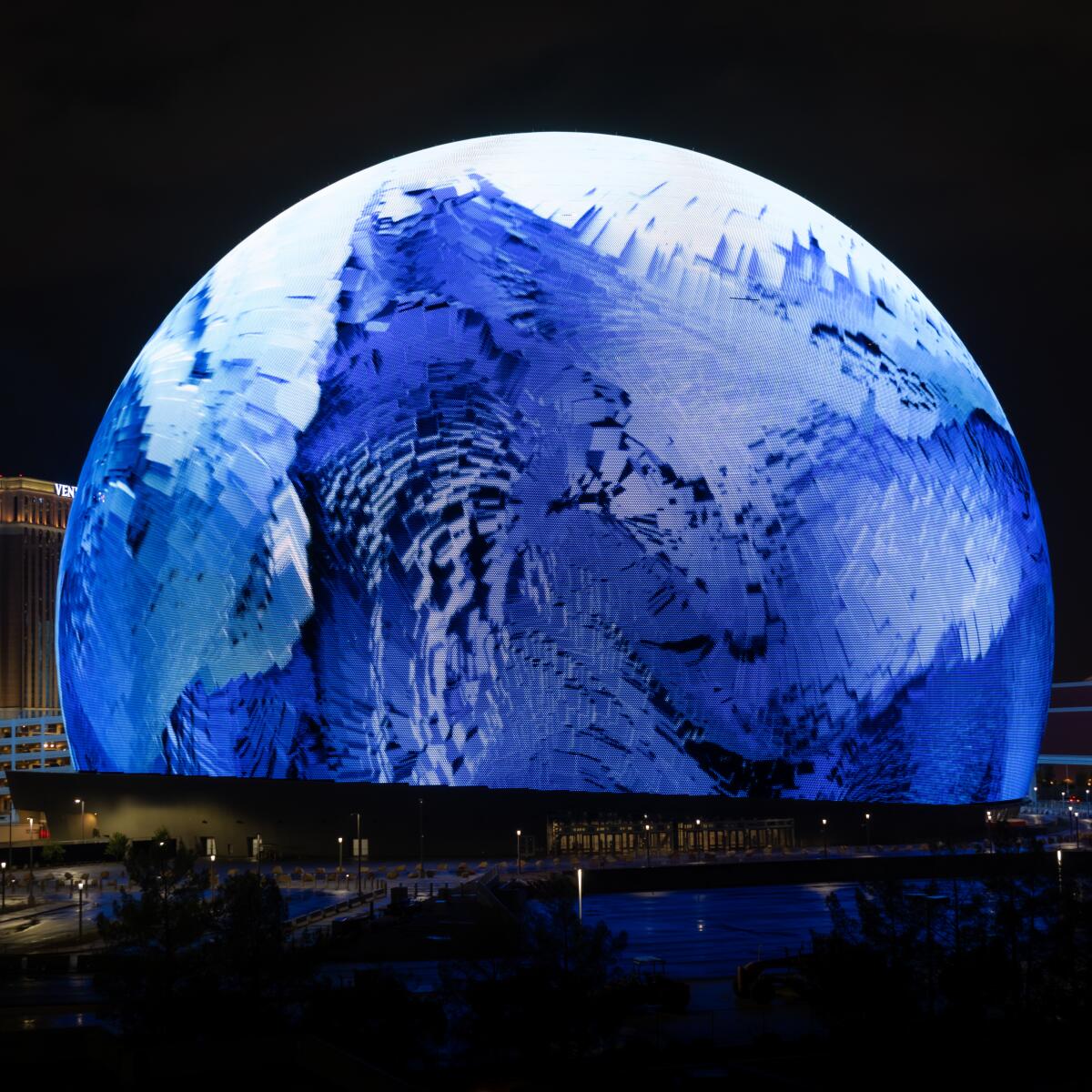
The “extraordinary” scale of “Machine Hallucinations: Sphere,” as Anadol describes it, has allowed him to stretch in new directions, “taking the video art form to new heights.” (Literally.)
And it’s the realization of a lifelong dream, he adds.
“This media embedded into architecture has been my vision now for so many years, since I watched ‘Blade Runner’ at 8 years old,” he says. “Now I’m an artist visualizing the winds of Vegas and transforming the world’s largest screen into sculpture. I’m able to dream.”
More to Read
The biggest entertainment stories
Get our big stories about Hollywood, film, television, music, arts, culture and more right in your inbox as soon as they publish.
You may occasionally receive promotional content from the Los Angeles Times.
